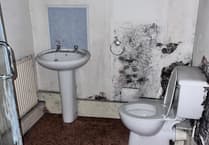South West Water (SWW), one of the worst performing companies in the sector, has defended its record at a public meeting in Kingsbridge chaired by Conservative MP, Anthony Mangnall.
More than 30 people, including town councillors and representatives of local community groups, heard three SWW representatives explain the firm’s position on investment, storm overflows, hosepipe bans and the dumping of raw sewage along Devon’s waterways and coastline.
The beleaguered firm has in recent times come under fire for sewage spills, which led to a record £2.1 million fine earlier this year, as well as the recent decision to increase dividends to 10.9 per cent for shareholders.
The company is also under investigation by regulator Ofwat over the accuracy of the data it provides on leakages, an aspect that was robustly defended at the meeting by Alan Burrows, SWW’s Director of Environmental Liaison and Culture.
Although he acknowledged the firm’s shortcomings on spills, Mr Burrows placed the onus for much of the region’s water quality and supply woes on consumer habits, current planing rules, intensive farming and the technical challenges of replacing existing pipework.
During the two-hour meeting, he conceded that in some areas SWW would not be able to meet targets on pollution, “purely because of funding and to make sure customer bills are not impacted”.
He also dismissed a recent report by the BBC that bills could go up by 40 per cent, although he did not say by how much they could increase.
Another hotly debated issue centres around storm overflows, which are designed to act as relief valves in the sewerage system during heavy downpours. Mr Burrows said “it’s a really difficult thing to fix” due partly to “technical complexities” which also involve funding. Last year, SWW’s parent company, Pennon Group, made a small net profit of £400,000. However, for the 2020-21 period, it made a £3 billion cash surplus and paid out almost £2 billion to shareholders.
Explaining SWW’s modus operandi as a privately-owned company, Mr Burrows said Pennon’s investors would “require some interest back on the money they give us – a bit like having a mortgage,” he said.
Significantly, he stressed consumers “needed to think about behaviour change”.
He said: “I remember when I was a kid I used to share a bath with my brothers on a Sunday evening. I probably didn’t shower the rest of the week. People are showering, having a bath once, twice, maybe three times a day now. It’s something we also need to think about - water isn’t an infinite source.”
He also warned consumers to act more responsibly to prevent blockages. “If we can remove everything other than sewage in the pipe, the pipe will be big enough 99 per cent of the time,” he said.
“If fats, oils... sanitary products (go in) it will in effect choke the sewer. They’re not designed to operate that way. There’s an element of customer behaviour (involved).”
The meeting was the third of its type organised by Mr Mangnall, MP for Totnes. He said SWW had committed itself to “trying to limit to 20 sewage spills to some areas and 10 near bathing areas”, which elicited groans from the public.
On environmental performance and SWW’s low two-star rating, Mr Burrows argued that the firm had done well on water quality but accepted it was “not good enough” and that the aim was to achieve four stars by 2025 at the latest.
One issue that drew support from the gathering – and Mr Mangnall – is the proposal to involve water companies more directly in house building projects. Vicky Garner, SWW’s Partnerships and Communities Coordinator, said it would help to make better planning decisions, especially around keeping surface water out of the system.
In response, Mr Mangnall revealed that Michael Gove, the Secretary of State for Levelling Up and Housing, was “fantastically” in favour of water companies becoming statutory consultees in development programmes.
Public anger
Louise Wainwright from the South Devon River Champions association questioned the company’s ambitious plans, citing the fact the company had made only a £400,000 profit this year.
Another woman, a keen swimmer, slammed SWW’s WaterFit live interactive map, claiming it had given false information on the state of the River Erme on pollution warnings. “I don’t trust this lot (SWW). The River Erme is the most polluted estuary in this area,” she fumed.
A man commented wryly on how in its defence SWW appealed to consumers to look at the data on pollution when the company was being investigated for failing to provide exactly that information.
Another member of the public raised concerns about building more homes in Devon as it would increase water demand and place a strain on services, while another suggested building more reservoirs to boost supply.
Local councillor, Denise O’Callaghan, was critical of privatisation, describing it as an experiment that hasn’t worked. “We should cut to the chase - the majority of people want nationalisation,” she said. She also noted how SWW charged “the highest bills in the country” while company executives earned million-pound bonuses.
Kingsbridge town mayor Philip Cole gave a damning assessment of the meeting by describing it as “a PR exercise”. He said: “They know they’re up to their neck in it and they’re trying to smooth out the problem. My personal view, not the council’s, is that they’re trying to pretend they’re running a service and they’re not – they’re running a money-making business.”
The next meeting is due to be held in Dartmouth.
Water in Devon, what you need to know:
l There are three water reservoirs in SWW’s region – Wimbleball, Roadford in Devon, and Colliford in Cornwall. They are all two-year refill reservoirs, which refers to the time it normally takes to fill up
l Water demand in 2022 was the highest it’s ever been in Devon. Average use is about 125-130 litres a day per person but last year that rose to between 150 and 160 litres
l Near real-time data on spills really means within an hour of a storm overflow operating
South West Water claims it has so far reduced leakage by 50 per cent
l South West Water has one of the worst ratings out of all the water companies in England with only one star in 2021, and two last year
l There are 655 sewage treatment plants across the region
l South West Water plans to invest £7.5 billion into Devon and Cornwall’s pipe network.





Comments
This article has no comments yet. Be the first to leave a comment.